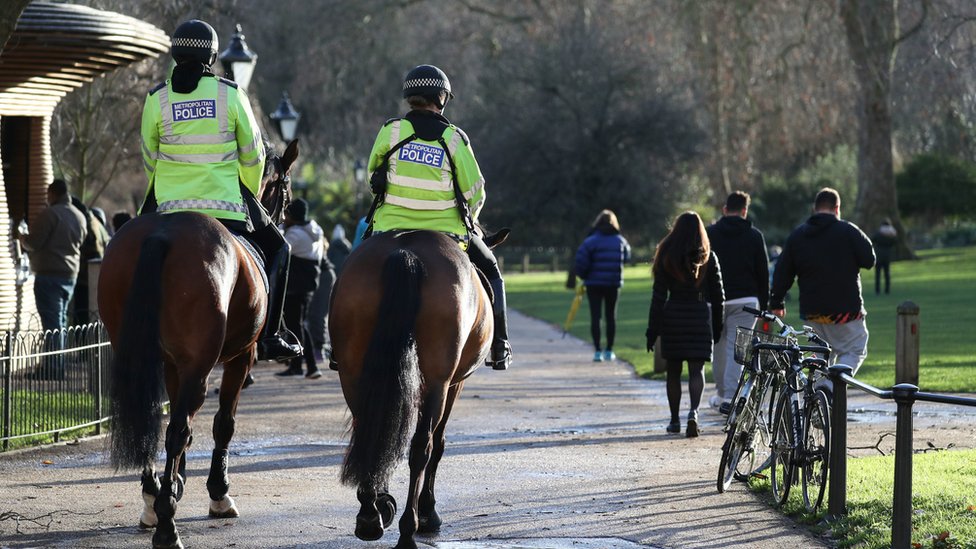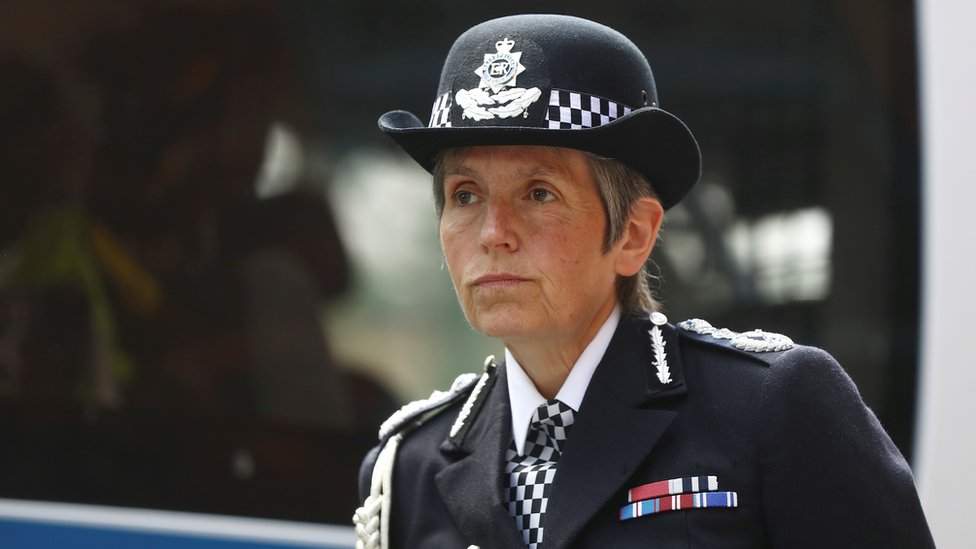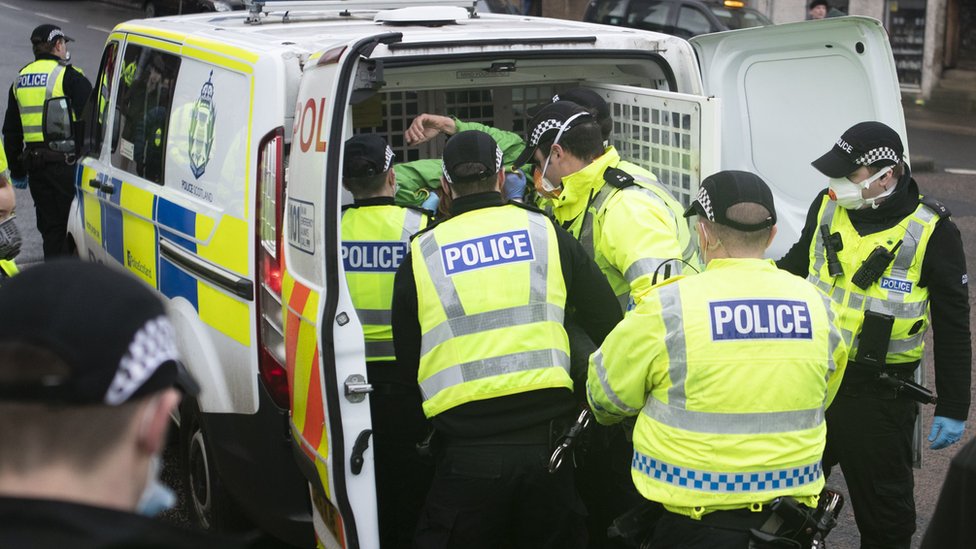
Metropolitan Police commissioner Dame Cressida Dick
wrote in the Times that Londoners have been hosting raves, house parties and gambling events.The policing minister confirmed Dame Cressida's pledge that rule-breakers are "increasingly likely" to be fined.
Kit Malthouse said people have a "duty" to make this lockdown "the last one".
"We are urging the small minority of people who aren't taking this seriously to do so now, and [are illustrating] to them that if they don't they are much more likely to get fined by the police," Mr Malthouse told BBC Breakfast.
"These current measures should in theory, if we all stick by them, be enough to drive the numbers down so that we can start to move through the gears of tiers from mid-February," he added.
Asked if tighter restrictions were on the way - something the health secretary has refused to rule out - Mr Malthouse said ministers were "on tenterhooks" watching the daily figures for Covid deaths, new cases and hospital admissions, as rules continue to be kept under review.
He said the government's ramped-up efforts to give vulnerable people the coronavirus vaccine should help the UK to "get back to some sort of normality later this year".
The BBC's political editor Laura Kuenssberg said there was currently no expectation that a more extensive clampdown of rules was on its way from Westminster.
The Scottish government's cabinet is due to meet on Tuesday to discuss restrictions.
'Flagrantly ignoring rules'
The latest figures on Monday showed a further 529 people had died within 28 days of a positive test in the UK, while another 46,169 cases were reported.
There are also more than 32,200 people in hospital in the UK with coronavirus, data shows.
Dame Cressida told Radio 4's Today programme some 75 police officers are joining 185 firefighters in being trained to drive ambulances in the capital, as London hospitals struggle with soaring numbers of Covid patients.
In her warning in the Times, she said her officers were still finding people breaking the rules, despite high rates of the virus and clear laws that ban social gatherings.

"Most people are doing the right thing to keep each other safe, but sadly a small minority of people continue to flagrantly ignore the rules, for example by holding house parties, meeting in basements to gamble or breaking into railway arches for unlicensed raves," she said.
"It is preposterous to me that anyone could be unaware of our duty to do all we can to stop the spread of the virus," she said, adding that people breaking Covid laws were "increasingly likely to face fines".
In England, Wales and Northern Ireland fines start at £200, but are lower in Scotland. Large parties can be shut down by the police, with fines of up to £10,000.
Dame Cressida said the move towards greater enforcement was "common sense" rather than a show of "dictatorial policing".
She also said Prime Minister Boris Johnson's cycle in east London at the weekend was "not against the law", but added the "stay local" rules on exercise for England could be made more clear.
Under Scotland's lockdown restrictions, people must start and finish their exercise in the same place - and to do so, they may travel up to five miles from the boundary of their local authority area. People in Wales should start and finish exercising from their home.
Asked if she would like to see similar detail in England's guidance, Dame Cressida said: "That is certainly something the government could consider.
"Anything that brings greater clarity, for officers and the public, in general, will be a good thing."
Police chiefs have been under increasing pressure to enforce the lockdown laws - with a number of news reports about breaches of Covid rules in recent days.
In England and Wales, police have issued 8,000 penalties since November.
Officers have been stopping people and asking them where they have travelled from, while elsewhere people have been discovered using pubs and gyms.
In one case, two women were fined £200 each by Derbyshire Police when they drove five miles for a walk together - but the force has since withdrawn the penalties.
After that incident gained widespread media attention, the National Police Chiefs' Council issued fresh guidance to officers.

Home Secretary Priti Patel has defended the way police have handled breaches, saying there is a need for "strong enforcement".
But psychologist Prof Stephen Reicher told BBC Newsnight evidence suggested 80-90% of people were by and large obeying the rules - except when it came to self-isolation where compliance was lower.
"The problem isn't people breaking the rules," said Prof Reicher, who sits on a committee of behavioural scientists that advises the Scientific Advisory Group for Emergencies (Sage).
"In many cases it's either the rules aren't clear enough, or the rules are too soft, or else people don't have the support to do what they're asked to do."

- PAY-PACKET SUPPORT: What do chancellor's plans mean for wages?
- LOOK-UP TOOL: How many cases in your area?
- GLOBAL SPREAD: How many worldwide cases are there?
- THE R NUMBER: What it means and why it matters

England is currently under a national lockdown, meaning people must stay at home and can go out only for limited reasons such as food shopping, exercise, or work if they cannot do so from home.
Similar lockdown measures are in place across much of Scotland, Wales and Northern Ireland - which are in charge of making their own coronavirus restrictions.
So far 2.3 million people in the UK have had a first dose of the coronavirus vaccine, as part of the government's plan to vaccinate tens of millions of people by the spring.
In her article, Dame Cressida said she was "delighted to hear" that a proposal to prioritise frontline officers to get vaccinated was being "actively discussed", as the rate of officers self-isolating has risen.

- 'AMERICA: STORMING THE CAPITOL': How safe is American democracy?
- IN NEED OF A NEW SERIES TO BINGE IN LOCKDOWN?: The Serpent is a twisting, real-life story of a murderer, thief and seductive master of disguise


Have you been affected by the issues raised in this story? You can share your experience by emailing haveyoursay@bbc.co.uk.
Please include a contact number if you are willing to speak to a BBC journalist. You can also get in touch in the following ways:
- WhatsApp: +44 7756 165803
- Tweet: @BBC_HaveYourSay
- Please read our terms & conditions and privacy policy
If you are reading this page and can't see the form you will need to visit the mobile version of the BBC website to submit your question or comment or you can email us at HaveYourSay@bbc.co.uk. Please include your name, age and location with any submission.
https://ift.tt/3nALT31
World
Bagikan Berita Ini














0 Response to "Covid-19: Rule-breakers 'increasingly likely' to be fined - Cressida Dick - BBC News"
Post a Comment